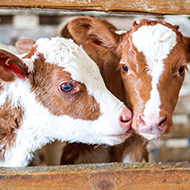Vet input sought for calf pneumonia test

Pneumonia is one of the most serious illnesses affecting calves and costs the UK cattle sector £50 million annually.
Researchers at the University of Surrey are seeking veterinary surgeons who work with calves to share their experiences of using diagnostic tests and managing calf pneumonia.
The call forms part of work to develop a new lateral flow test to enable the rapid diagnosis of pneumonia in calves. Led by a consortium at Surrey's School of Veterinary Medicine, the project aims to improve disease management and lead to faster treatment of affected animals.
Researchers have named the novel test RaDiCal, which will enable vets to input samples into a portable device that will quickly generate results and diagnoses of calves. The overall aim of the project is to allow farmers to take swift action to mitigate the risk of infection in their herds.
Project lead Mark Chambers, a professor of Microbiology and Disease Intervention, explained: “We are delighted to be leading the RaDiCal project and will be using our experience in veterinary infectious diseases and test development within an exciting consortium of other academics and representatives from industry, large animal veterinary practice, and farmers themselves at the sharp end of managing calf pneumonia.
“Through this close partnership and ongoing consultation, we shall ensure we develop a test that meets the needs of the cattle industry.”
Pneumonia, one of the most serious illnesses affecting calves, costs the UK cattle sector £50 million annually. Infection leads to lung inflammation in calves, and in extreme cases, the damage is irreversible and necessitates the slaughter of the animals.
The RaDiCal project is a collaboration with experts from Global Access Diagnostics, the University of Glasgow, Cardiff University, and Westpoint Farm Vets.
Dr Alison Wakeham, head of agriculture and animal health, GADx, said: “GADx’s expertise in lateral flow technology allows us to support a variety of disease areas. By applying our platform within the livestock industry, we are glad to be able to help improve disease management for one of the most significant diseases affecting calves.
“Working alongside other experts in this field through the consortium and with the support of BBSRC funding, we are looking forward to progressing the project and bringing the transformative test to market. Being able to accurately diagnose and treat early in the disease cycle is critical to prevent spread and control outbreaks.”
Veterinary surgeons interested in participating in the project are invited to fill in a short, anonymous survey. The English version is available here, and the Welsh version is available here.



 The veterinary mental health charity Vetlife is inviting the veterinary community to join it for a sponsored cold-water dip.
The veterinary mental health charity Vetlife is inviting the veterinary community to join it for a sponsored cold-water dip.